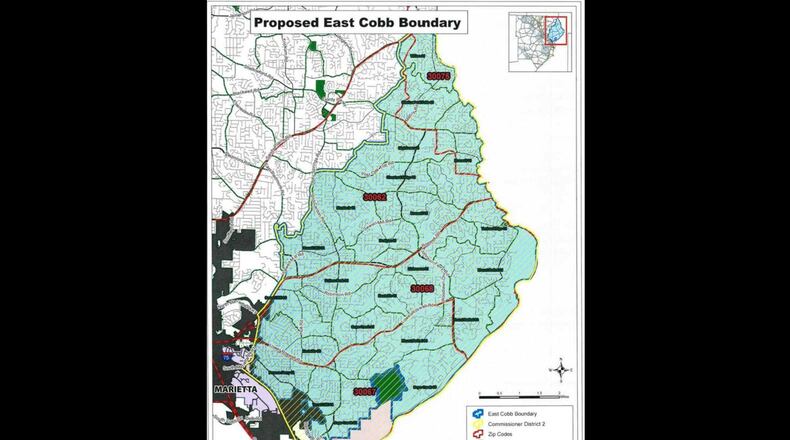Proponents of a new city of East Cobb are moving ahead with plans for a 2020 referendum by hiring a well-connected lobbyist to shepherd the proposal through the state legislature, although the cityhood effort has attracted little grassroots support so far.
East Cobb would be the county's first new city in more than 100 years — that is, if South Cobb doesn't beat it to the punch by incorporating first. The push to incorporate significant areas of Cobb follows a rash of new cities across the metro area that started with Sandy Springs in 2005.
Joe Gavalis, one of the organizers of the East Cobb cityhood movement, said his group is driven by concerns over policing, development and local control, especially when it comes to taxes. The proposed new city would be Cobb's largest, comprised of about 40 square miles and 97,000 residents east of Marietta to the Fulton County line.
But some residents appeared skeptical and want more information on the movement and who’s behind it. Gavalis, for his part, declined to identify the source of funding for The Committee for Cityhood in East Cobb, Inc. citing privacy concerns. The LLC is registered to East Cobb resident Owen Brown, a shopping center developer.
In addition to hiring longtime conservative activist Phil Kent to manage public relations and footing the bill for a $36,000 feasibility study from Georgia State, the LLC this week registered with the state and hired lobbyist John Garst to represent its interests at the capitol.
Garst is a Republican political operative who runs a lobbying firm with his wife, Cynthia, and Jared Thomas, who enjoys close ties with Governor Brian Kemp.
Gavalis said Garst was chosen for his experience to help usher the cityhood initiative through the state Capitol and General Assembly, which would have to signoff on the proposal before it can go on the ballot. Gavalis hopes to have it in time for the 2020 election.
“Our next step is to conduct community meetings and try to educate the public and air both sides,” Gavalis said. He did not offer any event dates, but said a public committee would be announced in the next few weeks.
But if the push for cityhood is to gain enough traction to win, Gavalis and his colleagues will have to come forward and convince a majority of their fellow voters that a city of East Cobb is in their best interest.
Linda Carver, president of the East Cobb Civic Association, which represents about 10,000 residents, said she hasn’t heard the same complaints about policing, development and representation that Gavalis cited, and a new city is not something members are “clamoring for.”
“There certainly has not seemed to be a groundswell,” Carver said. “I really don’t know what’s driving it.”
She said she was waiting for more information, adding that the civic association has not taken a position and may not do so at all.
Carol Sullivan, a 15-year resident of Creekside Bluff in the proposed city, said she was satisfied with services and questioned the findings of the feasibility study, which concluded that a new city could be created without a tax increase.
“I don’t think we’re going to end up with lower taxes,” she said of the proposed city. “I don’t buy the numbers.”
Kerwin Swint, a political scientist and interim dean at Kennesaw State University in Cobb, said a new city isn’t “an easy sell.”
“There will be another level of government and presumably taxation,” said Swint. “They’ll have to make the case that the residents will be better off.”
Gavalis said he put his faith in the feasibility study.
“It was an independent study done by Georgia State,” Gavalis said. “We’ve been as open as possible. We’re the ones that made the study available.”
About the Author
Keep Reading
The Latest
Featured




